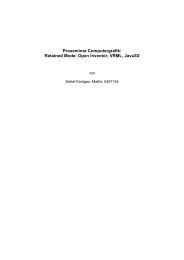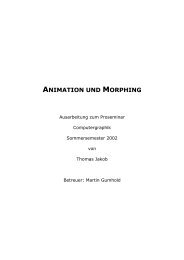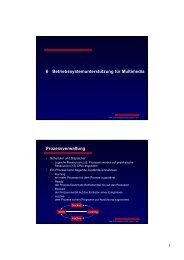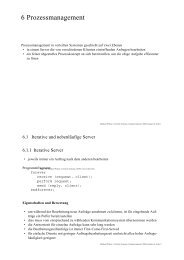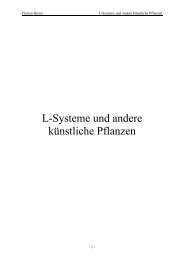World Wide Web – die Basis der ... - Universität Ulm
World Wide Web – die Basis der ... - Universität Ulm
World Wide Web – die Basis der ... - Universität Ulm
Sie wollen auch ein ePaper? Erhöhen Sie die Reichweite Ihrer Titel.
YUMPU macht aus Druck-PDFs automatisch weboptimierte ePaper, die Google liebt.
Das Wissen verdoppelt sich in <strong>der</strong> kommenden Zeit in immer kürzeren Abständen. Die<br />
Spezialisierung <strong>der</strong> Wissenschaftler schreitet immer mehr voran und <strong>die</strong> Frage nach <strong>der</strong><br />
Organisation des Wissens wird immer brennen<strong>der</strong>. Insbeson<strong>der</strong>e im 20. Jahrhun<strong>der</strong>t kommen<br />
weitere Me<strong>die</strong>ntypen hinzu. Neben den geschriebenen Text und <strong>die</strong> gedruckte Skizze treten<br />
beispielsweise Fotos, Filme und Tondokumente.<br />
Visionäre und Pioniere<br />
H.G. Wells (1866-1946) ist uns als Schriftsteller von „The Time Machine“ und an<strong>der</strong>en<br />
Vorläufern <strong>der</strong> Science Fiction Literatur bekannt. Er war es auch, <strong>der</strong> 1937 <strong>die</strong> Idee einer<br />
permanenten Welt-Enzyklopä<strong>die</strong> beschrieb. Er nannte <strong>die</strong>s <strong>World</strong> Brain. Aus einigen<br />
Textauszügen wird klar, welche Vision er damals hatte und welche Entwicklungen er bereits<br />
vorausdachte. So stellt er das vorherrschende universitäre System <strong>der</strong> Wissenskonservierung<br />
in Frage:<br />
„lies rather in [...] creating a new world organ for the collection, indexing,<br />
summarizing and release of knowledge, than in any further tinkering with the highly<br />
conservative and resistant university system, ...“<br />
Er beschreibt wie ein solches “Welthirn” aufgebaut und trainiert wird:<br />
„As the core of such an institution would be a world synthesis of bibliography<br />
and documentation with the indexed archives of the world. A great number of<br />
workers would be engaged perpetually in perfecting this index of human knowledge<br />
and keeping it up to date.“<br />
Er legt seine Vorstellungen von <strong>der</strong> technischen Umsetzung mittels Mikrofilm dar und <strong>die</strong><br />
daraus entstehenden Nutzungsszenarien:<br />
“By means of the microfilm, the rarest and most intricate documents and<br />
articles can be stu<strong>die</strong>d now at first hand, simultaneously in a score of projection<br />
rooms. There is no practical obstacle whatever now to the creation of an efficient<br />
index to all human knowledge, ideas and achievements, [...] A microfilm, coloured<br />
where necessary, occupying an inch or so of space and weighing little more than a<br />
letter, can be duplicated from the records and sent anywhere [...] so that the student<br />
may study it in every detail“<br />
„The whole human memory can be, and probably in a short time will be, made<br />
accessible to every individual. And [...] in this uncertain world where destruction<br />
becomes continually more frequent and unpredictable, is this, that photography<br />
affords now every facility for multiplying duplicates [...]. It need not be concentrated<br />
in any one single place. [...] It can be reproduced exactly and fully, in Peru, China,<br />
Iceland, ... “<br />
Mehr noch, erhofft er sich von seiner Idee den permanenten Weltfrieden, da es bei allseitiger<br />
Verfügbarkeit des Wissens für ihn kein Konfliktpotential mehr gibt:<br />
„A common ideology based on this Permanent <strong>World</strong> Encyclopaedia is a<br />
possible means, to some it seems the only means, of dissolving human conflict into<br />
unity.“<br />
Aber nicht H.G. Wells wird allgemein als Begrün<strong>der</strong> <strong>der</strong> <strong>World</strong> <strong>Wide</strong> <strong>Web</strong> Idee gesehen,<br />
son<strong>der</strong>n Vannevar Bush. Vannevar Bush beschreibt in seinem Artikel „As we may think“<br />
1945 eine informationstechnische Vision, <strong>die</strong> das Grundkonzept für ein Hypermediasystem<br />
darstellt. Die Tragweite <strong>der</strong> Ausführungen Bushs hat schon damals <strong>der</strong> Editor des Atlantic<br />
Monthly erkannt:






